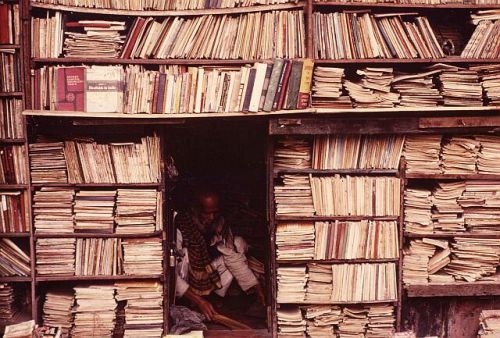
Writing in forms brings out the alienationist in me. Especially when I attempt sestina. Why? Because my grasp over forms is still not that strong. So, it's hard for me to exercise control over both the form and the material. So, the material begins to act more and more like a fill-in-the-gap, while I try to stay faithful to the formal constraints as much as possible. It's easier to rant about my despair than anything else in forms, especially the ones where repetition is the key structural cement. Here's a sestina I finished yesterday, for my Writing In Forms class. According to the prompt, we needed to write a sestina including a beverage, a tool, a color, a language, an animal, and an artist or an author as the end words.
Alienation
Chronicler of the unborn sisters of the iconic bards in blue,
Afraid of my own room in my father's house, dark as milk-less coffee,
I wandered around the city, craving to break it open with a hammer.
Instead, I shared my park-bench with a stray dog.
In my round schoolgirl's hand, translated entire paragraphs in Bengali
from a much-used, brittle volume by a memsahib named Woolf.
These two women in a room, of whom she wrote about—this Woolf,
exploded out of words written about them, like the knee-length tweeds in navy blue,
from which I felt bursting too, cursing in homecooked Bengali.
This city,peopled by historians alone, where men drink coffee
leaving their wives behind in locked kitchens, to pant like dogs,
I roamed the sidewalks, fingers flipping through pages, hammering
curse-words in the margins. The marble angel whispers promises, hammered
in the fountain, unable to move his head for a glimpse of a page of Woolf.
In the used bookshacks of in the rusty downtown, I, with dogged
determination, looked for foremothers. Girls my age, in satin-blue,
made out with lovers behind open umbrellas, refusing to drink coffee,
thus preserving the ivory of their skins, as befits girls of Bengal.
Me, who, more than anything else, is afraid of Bengaled,
would walk around the streets, head hammering
against illegible graffitis. Strutting in alone inside coffee
houses, inserting my own scribbles in the white spaces of Woolf's.
There was a girl with a flute,her scarf deeply blue.
Her cheeks in pink glitter, she vomited her story-quests in the ear of her per dog.
The street, that day, were strewn with broken clay birds and corpses of dogs.
The girl with the flute, out of sympathy, offered to buy my scribbles in Bengali.
Just like a Scheherazade, who had just finished a story, I felt the blues.
In an almost alley, on an old banyan branch, I learnt to hammer
strangers' stories, to avoid being beheaded. Did she ever, that (Mrs.) Woolf?
The town lunatic danced around me, stopping often enough to beg for coffee.
Trying to memorize the city streets, I see blood-drops in pots of coffee.
Money for school-lunches now exhausted, I carve clay dogs
for the toy-seller in the square, relieved she wouldn't know of Woolf
or her ghosts following me around. With callouses shaped like Bengali
alphabets in her palm, in the wings of her wooden birds, she hammers
steadiness. The nails gave her bruises, violet-blue.
The historians, while sipping coffee, try to fashion a Bengali sans expletives.
The girl, in order to avoid being beheaded, hammers her tales inside the tongues of the dog.
I burn my paragraphs from Woolf, the fire swallows the blue.
No comments:
Post a Comment